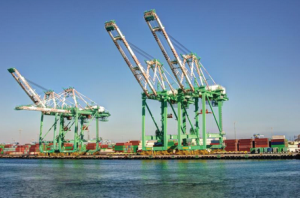
Cargo interests, shipping lines and railroads have done all they can to prepare for the July 1 expiration of the International Longshore and Warehouse Union contract. The trade community is now looking to the negotiations in San Francisco to see if an agreement will be reached without disruptions at West Coast ports.
Since the talks between the ILWU and waterfront employers began on May 12, nothing has happened to cause undue concern. Jim McKenna, president of the Pacific Maritime Association, which is negotiating on behalf of shipping lines and terminal operators, said on June 10 that negotiations “are ongoing and positive.” A previous joint statement by the ILWU and PMA expressed the same sentiment.
The trade community, of course, would welcome more detailed information on what is happening behind closed doors in San Francisco, but releasing sound bytes from the negotiations is not the style of the PMA and ILWU.
Cargo interests that ship through West Coast ports are taking nothing for granted. Some shippers are diverting cargo through ports in Canada and the East Coast. In a JOC survey in May, about two-thirds of the respondents said they would divert at least some of their cargo as the contract deadline approached.
A number of shippers have maintained their normal routing through West Coast ports but have moved product earlier than usual. Container volumes moving through Los Angeles-Long Beach were up about 10 percent in April compared with the same month last year. The Southern California gateway handles more than 60 percent of the container traffic on the Pacific Coast of North America.
Intermodal rail volumes have also been strong this spring. The Association of American Railroads reported that year-to-date freight volume was up 4.3 percent compared with the first five months on 2013, including a 9.1 percent increase in the last week of May.
Train speeds, a measurement of efficiency, also increased in May. The industry has recovered from the brutal winter back East that created bottlenecks all along the trans-continental rail network. Railroads also added equipment, so the rail carriers are confident they will be able to handle higher-than-usual traffic in the weeks leading up to July 1.
In the back of everyone’s mind, of course, is the chain of events that occurred in the 2002 contract negotiations that led to a 10-day employer lockout that resulted in missed sales, factory down time and added transportation costs.
The next important development could come on July 1. McKenna warned the trade community at the JOC’s TPM conference March 4 in Long Beach not to expect an agreement by July 1. Negotiating tactics are such that a missed deadline is perceived as giving both sides added leverage. That’s especially true for the union, because the “no-strike” clause in the existing contract expires.
However, if negotiators believe they are close to reaching an agreement, they could extend the no-strike clause for a week or two. Early July is usually uneventful anyway because it is a heavy vacation week. On the other hand, if negotiators are far apart on key issues, they may let the no-strike clause expire.
Traditional issues involving wages, pensions and other benefits are on the table again this year, but so far there have been no indications that these issues will be especially controversial.
Complete coverage of the ILWU negotiations
The two main issues appear to be added costs due to the Cadillac tax provision in the Affordable Health Care Act, and preserving ILWU jurisdiction as technology and automation eliminate some jobs while creating new jobs on the waterfront.
West Coast ports have certainly had their share of inter-union jurisdictional disputes the past three years in the bulk and breakbulk areas as well as in the container sector. More than a dozen disputes up and down the coast have resulted in work slowdowns and stoppages. Some of the disputes have been especially bitter and have poisoned relations between individual employers and ILWU locals.
The new chassis regime in which carriers are divesting themselves of chassis and selling them to equipment lessors and chassis pool operators could cause problems. The new equipment owners are not members of the PMA and therefore have no obligation to contract with the ILWU, or any union for that matter, for the maintenance and repair of chassis.
M&R jurisdiction involving cargo-handling equipment and cranes is ripe for conflict because the ILWU at some facilities already shares jurisdiction with unions such as the International Association of Machinists and the International Brotherhood of Electrical Workers for existing equipment. How M&R jurisdiction will be determined as never-before-used equipment such as automated guided vehicles and automated stacking cranes are introduced in Los Angeles-Long Beach could be an issue.
Even if the PMA and ILWU come to a contractual agreement on these issues, other unions charge that despite what the new contract between the ILWU and PMA states, the PMA may not control certain areas of jurisdiction that are being granted to the ILWU. Lawsuits could result.
Also, the question of skill sets arises as some electrical or mechanical craft unions with intensive training programs question the ability of a trade union like the ILWU to maintain and repair the new, highly sophisticated equipment that is being introduced at automated terminals.
The Affordable Health Care Act’s “Cadillac tax” on generous medical plans is projected to cost the industry $150 million a year, McKenna said. Employers pay the entire cost of premiums for ILWU medical insurance. Longshoremen pay only a $1 co-pay for medical prescriptions.
Employers say that plan is generous enough and, furthermore, they can’t afford to pick up any more expenses in that area. The ILWU does not want to pay for the additional costs. The answer may be to negotiate a three-year contract because the Cadillac tax does not begin until 2018.
Bill Mongelluzzo, Senior Editor | Jun 11, 2014 3:21PM EDT

